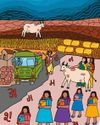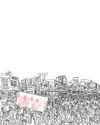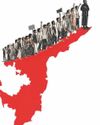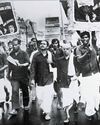Intentar ORO - Gratis
The Place at the End of the World
Outlook
|January 11, 2025
War correspondent Janine di Giovanni has covered almost every major armed conflict in the world since the 1990s.

"How do you write about war?" Janine di Giovanni repeats the question, pausing for a second. She is speaking over the phone from Paris where she lives with her young son, Luca Girodon. In a few days, she is scheduled for surgery. There is no trace of self-pity in her voice when she brings it up. It's a fact, not a tragedy. "The most effective way to write about war is to tell the human story," says the veteran journalist. "You try to find out how people survive; how families forage for food and keep kids warm. How they deal with unimaginable loss. War robs people of everything: homes and jobs, water, food, electricity. It brings disease and starvation and rips apart society, but in the midst of all that suffering, you also see tremendous stories of human strength." Her mission has been to share these stories so people everywhere could put themselves in the shoes of those who live in war zones.
Whether reporting from Syria or Lebanon, Sarajevo or Rwanda, she has always focused on sharing the human cost of war. The aim is to empathise, not sensationalise. To spend time with people whose lives are ruptured by violence, to write about the "small voices" that are often neglected.
"Articles, books-everything I've written-is meant to help my readers experience what it actually feels like to be in a war zone, what life is like there," she says. She is a staunch believer in the power of human rights reporting. This keeps her going in a world that is perpetually at war.
The war in Gaza leaves her distraught. "So many Palestinians have become homeless," she says. "People are starving; they don't have blankets to shield themselves from the cold. Pregnant women give birth without anaesthetics because of a shortage." Women, she points out, are the first casualty of any war.
Esta historia es de la edición January 11, 2025 de Outlook.
Suscríbete a Magzter GOLD para acceder a miles de historias premium seleccionadas y a más de 9000 revistas y periódicos.
¿Ya eres suscriptor? Iniciar sesión
MÁS HISTORIAS DE Outlook

Outlook
The Big Blind Spot
Caste boundaries still shape social relations in Tamil Nadu-a state long rooted in self-respect politics
8 mins
December 11, 2025

Outlook
Jat Yamla Pagla Deewana
Dharmendra's tenderness revealed itself without any threats to his masculinity. He adapted himself throughout his 65-year-long career as both a product and creature of the times he lived through
5 mins
December 11, 2025

Outlook
Fairytale of a Fallow Land
Hope Bihar can once again be that impossibly noisy village in Phanishwar Nath Renu's Parti Parikatha-divided, yes, but still capable of insisting that rights are not favours and development is more than a slogan shouted from a stage
14 mins
December 11, 2025

Outlook
The Lesser Daughters of the Goddess
The Dravidian movement waged an ideological war against the devadasi system. As former devadasis lead a new wave of resistance, the practice is quietly sustained by caste, poverty, superstition and inherited ritual
2 mins
December 11, 2025

Outlook
The Meaning of Mariadhai
After a hundred years, what has happened to the idea of self-respect in contemporary Tamil society?
5 mins
December 11, 2025

Outlook
When the State is the Killer
The war on drugs continues to be a war on the poor
5 mins
December 11, 2025

Outlook
We Are Intellectuals
A senior law officer argued in the Supreme Court that \"intellectuals\" could be more dangerous than \"ground-level terrorists\"
5 mins
December 11, 2025

Outlook
An Equal Stage
The Dravidian Movement used novels, plays, films and even politics to spread its ideology
12 mins
December 11, 2025

Outlook
The Dignity in Self-Respect
How Periyar and the Self-Respect Movement took shape in Tamil Nadu and why the state has done better than the rest of the country on many social, civil and public parameters
5 mins
December 11, 2025

Outlook
When Sukumaar Met Elakkiya
Self-respect marriage remains a force of socio-political change even a century later
7 mins
December 11, 2025
Listen
Translate
Change font size
